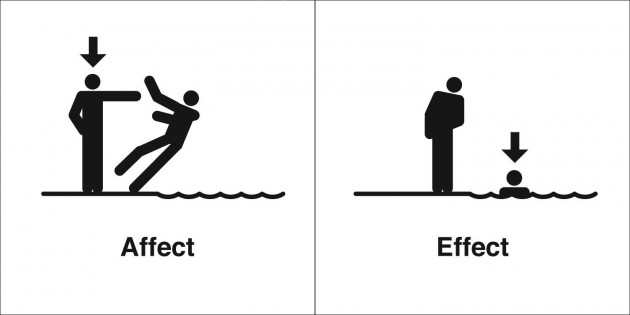Common Mistakes: Affect vs. Effect
Recently I wrote about the confusion surrounding the use of bad and badly, and I was a little surprised at the response I received on the Language Trainers Facebook page—that is to say, I was surprised there was any response at all! That’s why I decided to give it another go and explain two other words that can be confusing to use: affect vs effect.
Affect or Effect? Meaning and Usage
To make things easier to understand, I’ll give the general rule before I start getting into all the confusing exceptions. The majority of the time, affect is used as a verb, and effect is used as a noun. Again, there are instances where this isn’t the case, but for the most part this rule is all you’ll need.
To help you remember the correct usages, try this trick I learned in high school and think about Edgar Allen Poe and his RAVEN:
Remember Affect Verb Effect Noun
With that out of the way, let’s get to the good stuff!
Affect Vs. Effect – Round 1: When to Use Affect
Like I mentioned earlier, affect is almost always used as a verb. In this usage, to affect something is to influence or produce a change in it.
Julie wondered how her sleeping habits were affecting her grades.
Affect can also mean to adopt a use, style, or manner of doing something.
She affected an air of sophistication.
The exception to using affect as a verb comes into play when you’re talking about psychology. In this context, affect can be used as a noun to indicate an observable expression of emotion. When used in this manner, there is generally more emphasis put on the first syllable of the word (AFF-ect).
She displayed a flat affect.
In case you were wondering, having a “flat affect” means showing little or no emotions. Unless you work in a field where you are analyzing people’s mental status, chances are you won’t be using affect in this was very often, so stick to the general rule and use affect as a verb.
Affect vs Effect – Round 2: When to Use Effect
 Effect, on the other hand, is mostly commonly used as a noun meaning the result or impact of something.
Effect, on the other hand, is mostly commonly used as a noun meaning the result or impact of something.
The effect of making the correct choice is a better grade.
It can also refer to belongings.
Take your personal effects with you when you leave.
Here comes the confusing exception to the rule: less commonly, effect can be used as a verb which means “to succeed in making or doing something.”
They effected their escape through a rear window.
Or
I hope to effect a change with my petition.
Did our little “Affect vs. Effect” guide help to clear things up a bit? I really hope so. I know it can be confusing, but about 80% of the time all you’ll need to remember is RAVEN.
How did this article affect you? Did it produce a positive effect where your written communications are concerned?
Article updated on June 30, 2023

